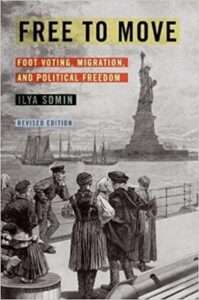The Volokh Conspiracy
Mostly law professors | Sometimes contrarian | Often libertarian | Always independent
What's New in the Revised Edition of Free to Move" - Part I: Pandemic Migration Restrictions
For obvious reasons, this important issue wasn't in the first edition of the book. But it's covered in some detail in the new one.

The revised edition of my book Free to Move: Foot Voting, Migration, and Political Freedom comes out on December 1, and is already available for preordering on Amazon and the Oxford University Press website. If you purchase it at the OUP site, you can use coupon code ALAUTHC4 to get a 30% discount.
In this post, I take a closer look at one of several new issues covered in the new edition of the book that were not in the original: the case for using migration restrictions to stop the spread of deadly contagious diseases, such as the Covid-19 virus. Such policies are far from a new idea. But during the Covid pandemic, both the US and some other nations applied such policies on a larger scale than ever before. In a new section of Chapter 6 of the book, I criticized such policies on a variety of grounds.
I adapted some of the points made in the book in a recent article in The Hill:
The coronavirus pandemic has led the United States and other nations to enact unprecedentedly severe migration restrictions. As a result of measures adopted under the Trump administration last year, the U.S. became more closed to immigration than at any other time in its history. While the Biden administration has lifted some of the restrictions, others remain in place….
These restrictions failed dismally in the goal of containing the spread of the COVID-19 virus to the United States, where more than 750,000 Americans have died from COVID-19. The continuation of many restrictions did not prevent the more contagious Alpha and Delta variants from swiftly establishing themselves here, either. At best, restrictions only briefly delayed the entry of the virus….
Pandemic-related migration restrictions have inflicted immense suffering on people fleeing poverty and oppression, including refugees escaping violence, poverty and repressive regimes in Cuba, Venezuela and Haiti. Many of those expelled under Title 42 and other policies may be condemned to a lifetime of privation or even death….
In many situations, migration restrictions actually make things worse by facilitating the spread of disease, and reducing scientific innovation:
[M]igration restrictions may do more to spread the disease than contain it. By making it nearly impossible for most migrants to enter the United States legally, we have created a large population of undocumented migrants who have strong incentives to avoid vaccination and testing, lest they come to the attention of authorities seeking to deport them. Additionally, migration detention facilities used to facilitate deportation can foster the spread of disease because of poor sanitation….
Immigrants to the U.S. and Europe make disproportionate contributions to medical, scientific and technological innovations, and immigration restrictions could block many such advances. The Moderna and Pfizer COVID-19 vaccines were both developed by firms led by immigrants or children of immigrants from poor nations, who could not have made their vital contributions to these breakthroughs had they or their parents been barred from leaving their countries of origin…. Some of the migrants the U.S. government barred during the past 18 months might have gone on to make great technological and medical breakthroughs of their own.
In the book, I go into this issue in much greater detail. Among other things, I explain why, even if migration restrictions do curb the spread of disease to some extent, there are superior alternatives that are both more effective and more humane, such as requiring temporary quarantine or vaccination. I also discuss the imposition of pandemic-era restrictions on internal migration. These, too, were used during the pandemic, though far less extensively than constraints on international migration. As with nearly every other justification for restricting international migration, if applied consistently, the disease rationale can also be used to justify severe restrictions on internal freedom of movement.
In future posts, I will provide an overview of some other new issues in the revised edition, such as the implications of widespread remote work for foot voting, and the danger that migration could trigger a nationalist backlash that threatens liberal democracy.


Show Comments (3)